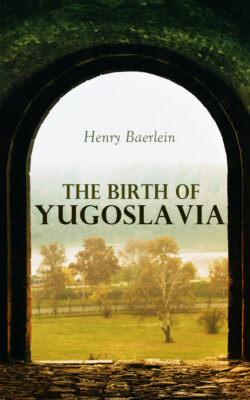Читать книгу The Birth of Yugoslavia - Henry Baerlein - Страница 85
На сайте Литреса книга снята с продажи.
AUSTRIA LEANS ON GERMANS AND ITALIANISTS
ОглавлениеFor a moment after her Italian misfortunes Austria assumed a kindly mien towards her Slavs. In the manifesto of July 15, 1859, which made public the treaty of peace, the Emperor promised "immediate modifications in the laws and in the administration." Bach, the German reactionary, was succeeded by Goluchowski, and in April 1861 Ivan Mazuranić became the Croat Chancellor at Vienna, with educational, legal and religious affairs included in the sphere of his office. The incorporation with Dalmatia was not granted then, but was promised. A letter was, however, sent to Mamula, the governor of Dalmatia, ordering him to create a majority hostile to the Emperor's letter of December 5, 1860, in which he had invited the two provinces to send their delegate to a conference at which the union would be discussed. The shrill protests of the German party were successful; for the next few years the Slavs were being pushed into their pit and then helped half-way out again. Schmerling, the German, would evolve an electoral system by which the Parliament must always have a German majority; Francis Deak, the Hungarian, would make excellent proposals that too often suffered shipwreck through no fault of his, he would manage to pass liberal legislation which remained in after years upon the statute book and was exhibited by Magyars to appreciative foreigners. The general tendency of those years after the Italian disaster was unfavourable to the Slav. In southern Hungary the Serbian duchy was dissolved, despite their protests, after an existence of eleven years. But as Francis Joseph was no longer able to bestow caresses on the recreant Italians he transferred his love to the Dalmatian autonomists, who now began to call themselves the Italian party. It is probable that he smiled on these 2½ per cent. of the province, not only because of his family traditions, his leaning towards Italian art and the hope against hope that he would once more some day rule in Italy, where he had his numerous well-wishers among the clergy and the rural population—it is possible that he was gracious to the autonomist Dalmatian party because they were a brake upon the national sentiments. Until 1866 the whole administration was conducted in the language of the 2½ per cent. In that year the Ministers of Justice and of the Interior decided to ask officials who thenceforward entered the Dalmatian service to have some sort of knowledge of the Illyrian language. In 1869 these Ministers permitted the Dalmatian communities to correspond in their own language with the tribunals and the administrative authorities; while in 1887 the administrative authorities and the tribunals were ordered to reply in Serbo-Croat to the local bodies who used that language. The autonomist party may not appeal to us and apparently it did not appeal to Nicolo Tommaseo. From wherever he is he must be looking on with interest at a controversy between two Italian writers who both published books on Dalmatia in 1915 and who bear witness—Mr. Cippico to the truth that Tommaseo was an autonomist and Mr. Prezzolini to the truth that he was not. "The theory of Tommaseo," says Mr. Cippico, "desires an autonomous Dalmatia between the mountains and the sea." "Go to!" says Mr. Prezzolini. "Have the kindness to read what the man writes. Here is a passage: 'Whatever one may say about it, it will not be Croatia, a poor country, lacking in civilization, but the opulent Slav provinces subject to Turkey and morally less in subjection than Croatia, which, when they and Dalmatia are united, will make her wealthy and the mother of civilization and wealth. Destiny therefore lays it down that Dalmatia in the days to come shall be the friend and not the subject of Italy.' Tommaseo showed in 1848 what he thought of such a subjection. 'In 1848,' he writes, 'I could have raised the whole of Dalmatia with the help of an Italian colonel who with his men had offered to dislodge the German governor of Zadar, but I refused; I refused, because I foresaw.' And just as he was opposed to the union with Italy, so likewise was he opposed to autonomy. You spoke of mountains and the sea. Permit me to direct your attention to some lines of his:
'Nè più tre il monte e il mar, povero lembo
Di terra e poche iznude isole sparte,
O Patria mia, sarai; ma la rinata
Serbia (guerniera mano e mite spirto)
E quanti campi, all' italo sorriso
Nati, impaluda l'ottoman letargo,
Teco una vita ed un voler faranno. … '
This one would translate as follows: 'Thou shalt no longer be, O my country, a poor stretch of land between the mountains and the sea, with some bare scattered islands; but Serbia reborn, that is now sicklied o'er with Turkish lethargy, shall make one life and one desire with thee and with all these fields that sprung into being under an Italian smile.' If you really think that this proves that Tommaseo contemplated a harmonious coexistence in Dalmatia of the two countries, Serbia and Italy, then I beg you to read the passage once again." This Mr. Antonio Cippico, by the way, is a native of Dalmatia with most Italian sympathies; another Cippico from Dalmatia, a cousin of his, has for years been a well-known littérateur in Belgrade, and according to him the great majority of the Cippico family are of his way of thinking.
